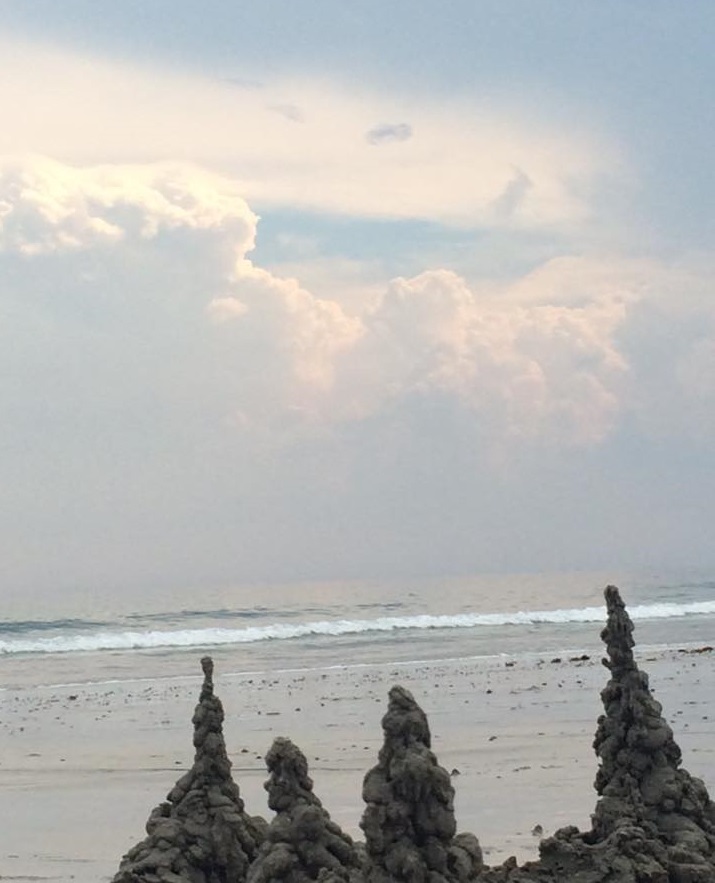I have been trying to keep facts straight, waiting for a narrative, but now I realize my family story is a series of recognitions. A tailor emigrates from London in 1642 to the Colonizer-named Watertown, Massachusetts as part of the Great Migration from England between 1620-1640 of approximately 20 thousand people, some deemed “Adventures,” while many come as indentured servants. Watertown, on the banks of a river, is already occupied by Pequossette and Nonantum people who fish for herring, tend crops, and live in longhouses. The coast of Colonizer dubbed New England has native Wampanoag, Massachusetts, Pennacook, Nauset, Permaquid, and Abenaki totaling in many tens of thousands to over 100,000. These indigenous tribes have occupied coastal land for nearly 6,000 years, fishing, growing crops, especially corn, and, with the arrival of nonindigenous people, trapping for the fur of beaver and otter for trade. But beginning in 1616 a series of early explorer-induced pestilence devastated all but a few hundred native people. Colonizers from abroad arrive to ghost villages, untended fields, and unimaginable skeletal remains. Colonizers understand this tragedy as Providence: a divine plan to ease access to land.
RECOGNITION #1: Living on native land means learning the history of colonization and the deep pain it deals to indigenous people who hold this pain and loss today.
RECOGNITION #2: As a Colonizer, I am a guest on Massachusetts and now Huichin, land dubbed Oakland by settlers. It is my responsibility to understand colonizer history and the associated pain and loss for First Nation people and the privileges incurred from White Supremacy and erasure history.
Other family, weavers in London, reunite in Watertown with the tailor in 1666, coincident with the Great Fire that burned London, a series of their own plagues, and religious persecution resulting in people being burned at the stake. Money out of London, supplying the cash for colonization, requires some appeasement that native people are fairly negotiated with, resulting in further horror with the sexual abuse and abduction of Pocahontas to be paraded past English high society in London before she dies of poisoning.
RECOGNITION #3: Power over other people means abuse and violence that becomes cyclical unless it is healed. Before we can heal and repair, we must first acknowledge.
By 1692 in Colonizer dubbed New England, God’s displeasure was considered in full force with a war between the French and native people, the worst weather recorded*, and accusations of Satan-possessed witches (100,000 accused in England, many hundreds accused in Massachusetts). The witch hunts in Massachusetts were presided over by judges who held most of the Colony’s assets, as well as industry in neighboring Maine that suffers loss due to war-related burning. A climate of panic and fear descends. In my genealogy research I discover that the relative that was hung as a witch is accused by a family we later marry into. We are officially both the accused and the accuser.
RECOGNITION #4: Internalized oppression is real.
The family history I grew up with includes that innocent elder hung as a witch, a hardware store owner and esteemed elder of the Salem Now Danvers community, a blacksmith in the granite quarry of Rockport, and a teacher who taught generations in this little fishing village of Rockport. I am a third generation public school teacher. My two nieces are now teachers. Serving community is part of my blood. I return to Rockport every year to hear about my family, to bask in the beauty of the waters, and find a little bit of myself in the small town nature of chatting over an Old Fashioned donut at the coffee shop counter, giving my company to a strong and scared young swimmer with a big imagination about what might join her in the waters, and stopping the car to let someone out of their driveway.
RECOGNITION #5: If I do not learn and acknowledge the history of this Massachusetts land and the Huichin land by the Bay where I now call home, what I so value and identify and hold sacred in these lands is as ephemeral as my sandcastle facing the incoming tide.

- “The worst weather ever recorded” has now been attributed to the genocide of millions of indigenous people by European colonizers, which caused large areas of farmland to go abandoned and reforested, eliciting a massive decrease in carbon dioxide leading to a global chill that is now known as the Little Ice Age.
HorSe Tuuxi (Good day) : The Sogorea Te Land Trust is an urban Indigenous women-led community organization that facilitates the return of Chochenyo and Karkin Ohlone lands in the San Francisco Bay Area to Indigenous stewardship. Sogorea Te creates opportunities for all people living in Ohlone territory to work together to re-envision the Bay Area community and what it means to live on Ohlone land. Guided by the belief that land is the foundation that can bring us together, Sogorea Te calls on us all to heal from the legacies of colonialism and genocide, to remember different ways of living, and to do the work that our ancestors and future generations are calling us to do.
HorSe Tuuxi (Good day)
Learned a lot here Jane, especially about huge population loss and massacre from disease and resultant reforestation of cultivated lands and little ice age. The Earth is a remarkable place enduring and also fragile and its inhabitants more so. Thank you for the beautiful and elucidating history of your ancestors in what is known as Rockport, , Mass.